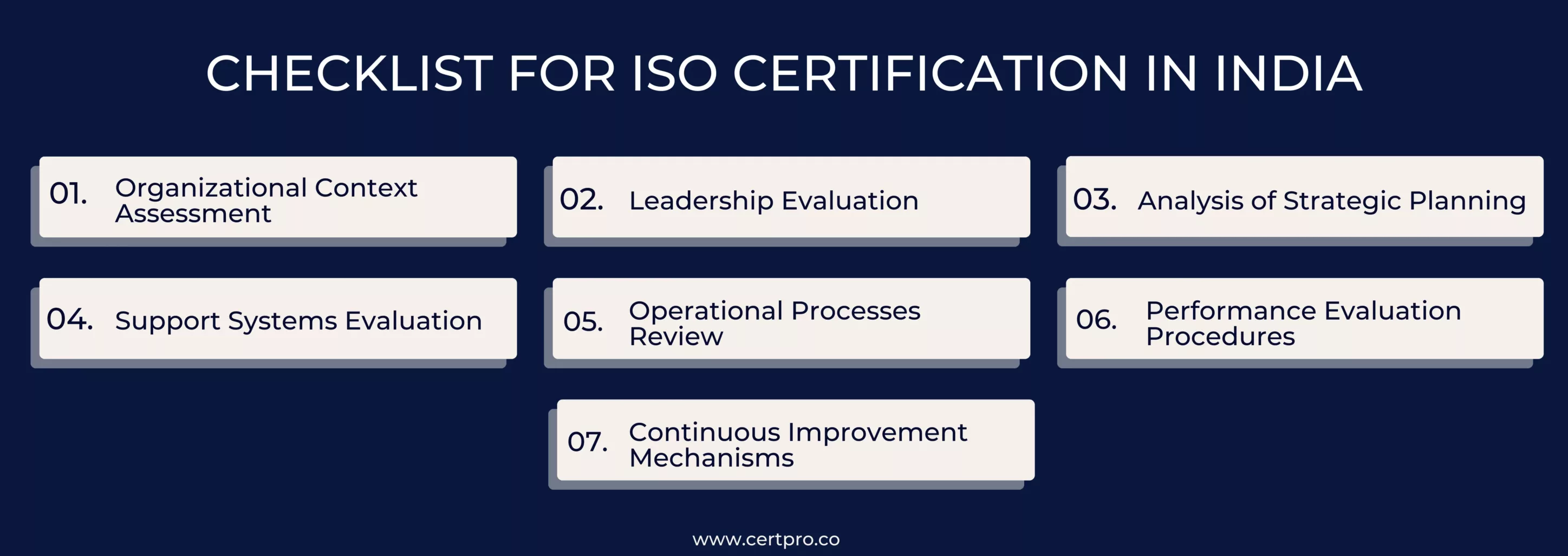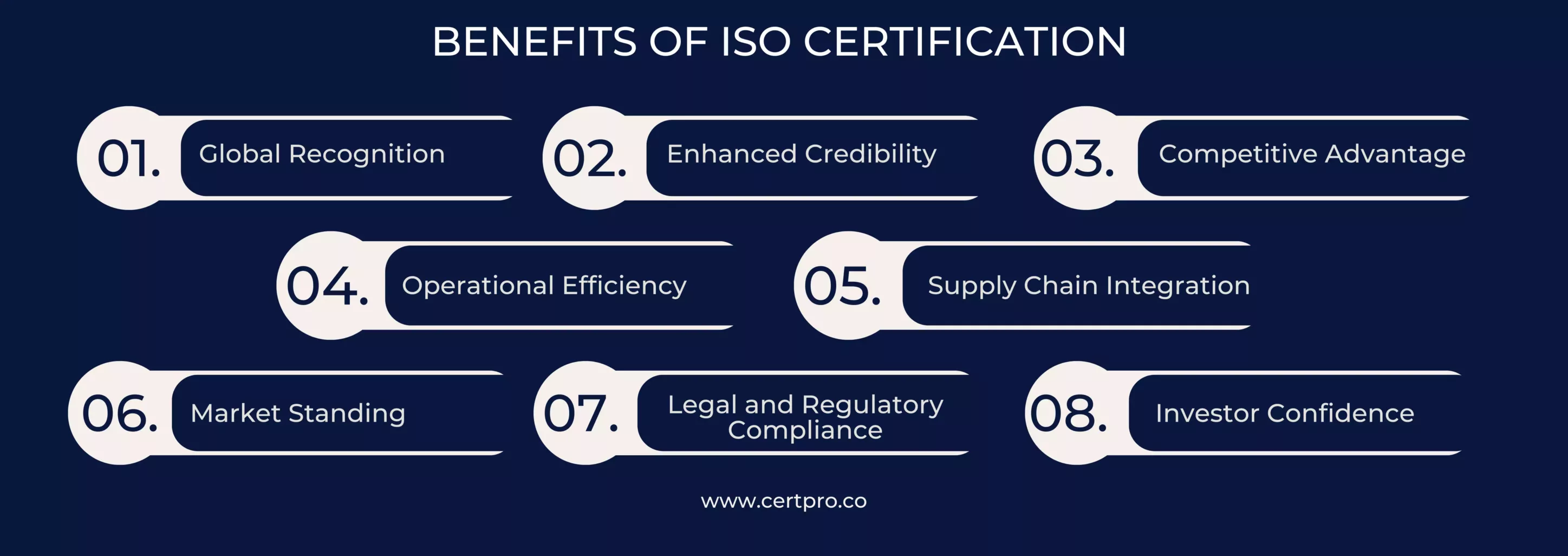INDIA
iso certification in INDIA
For companies operating in India, ISO certification plays a pivotal role in establishing trust, ensuring quality, and enhancing operational efficiency. Acquiring ISO certification signifies a company’s unwavering commitment to maintaining rigorous standards across diverse industries. Notably, ISO 9001 certification empowers Indian businesses by focusing on quality management, enabling the production of reliable and customer-centric products and services. Equally important, ISO 14001 addresses environmental management, a crucial aspect for a nation striving for sustainable development amidst rapid industrial growth. In line with India’s digital transformation aspirations, ISO certification in India, particularly ISO 27001, becomes indispensable for safeguarding sensitive information in the evolving digital landscape.
These certifications gain particular significance in India’s multifaceted market, bolstering consumer confidence and providing companies with a global competitive edge. ISO certification signifies adherence to stringent standards, leading to improved product reliability and reduced waste. Moreover, it streamlines processes, boosting productivity and reducing cost. Numerous ISO certification bodies operate in India, offering assessment, guidance, and certification services to assist businesses in navigating the certification journey effectively. In essence, ISO certification in India empowers companies to establish robust frameworks, align with international best practices, and contribute to the nation’s progress by championing quality, sustainability, and security.
Why ISO Certification in India?
In India, understanding the process of getting ISO certification is crucial for companies aiming to ensure quality, adhere to regulations, and tap into global markets. This certification not only instills confidence in consumers but also enhances operational efficiency and fosters sustainability. In the dynamic and competitive landscape of India, companies must secure ISO certification to effectively compete, manage risks, and align with international standards.
ISO accreditation in India serves as a visible commitment to international standards, fostering trust among stakeholders, including clients, partners, and investors. It plays a crucial role in facilitating international trade by reducing barriers and expanding acceptance. Companies holding ISO certifications gain a competitive edge in India’s market, signaling their dedication to excellence, efficiency, and continual improvement. The alignment with ISO standards streamlines operations, leading to cost savings and heightened efficiency. Customers benefit from the assurance of consistent, high-quality products and services.
Moreover, for businesses seeking ISO certification in India, it’s essential to understand and navigate the ISO certification process. This process is instrumental in supply chain integration, particularly as international partners often require it. In summary, the ISO certification process in India contributes to improved operational excellence, enhanced customer relations, increased global market access, elevated market standing, and the adoption of eco-conscious practices. These factors collectively contribute to the domestic and global success of Indian enterprises. Understanding how to get ISO certification in India is a critical step for companies aiming to leverage these benefits.
UNDERSTANDING ISO CERTIFICATION IN INDIA
The importance of ISO certification in India for demonstrating a company’s adherence to international standards cannot be understated. A dedication to operational excellence, efficiency, and quality can be seen in obtaining ISO accreditation. In India, ISO 9001 certification denotes a business’ commitment to provide trustworthy and excellent goods and services. The ISO 14001 standard addresses environmental responsibility as India develops its industrial base and places a strong emphasis on sustainable growth. The focus of ISO 27001 is on protecting sensitive data and information, which is particularly relevant to
Related Links
SOC 2 in India
ISO 27701 in India
GDPR in India
ISO 27018 in India
HIPAA in India
CCPA in India
PIPEDA in India
ISO 17025 in India
ISO 13485 in India
CE Mark in India
GDP in India
GLP in India
ISO 9001 in India
ISO 14001 in India
ISO 45001 in India
ISO 22000 in India
HACCP in India
ISO 22301 in India
ISO 21001 in India
ISO 41001 in India
ISO 20000-1 in India
India’s journey toward digital transformation. The diversified Indian market gains a lot from ISO certification, which boosts consumer confidence and makes it possible for businesses to compete on a worldwide scale. Beyond demonstrating adherence to strict guidelines, ISO certification improves product dependability by streamlining procedures, cutting waste, and getting rid of inefficiencies.
In essence, ISO certification in India empowers businesses to establish robust structures aligned with international best practices. Companies that prioritize quality, sustainability, and security not only enhance their own success but also elevate India’s reputation internationally. ISO certification serves as a formal acknowledgment by the International Organization for Standardization (ISO) that an organization’s management system, processes, products, or services meet established requirements. This global, independent organization creates and disseminates standards to ensure effectiveness, safety, and quality across diverse industries. The widespread acceptance of ISO standards enables Indian enterprises to access foreign markets with credibility. ISO-certified companies often enjoy a competitive advantage by showcasing a commitment to quality and continuous improvement. ISO 14001 certification addresses environmental management, aligning with India’s sustainability focus. ISO standards frequently emphasize customer requirements, enhancing satisfaction and retention. ISO certification is particularly crucial for Indian suppliers in global supply chains. Continuous improvement, central to ISO certification, aids Indian businesses in optimizing operations and maintaining competitiveness. Ultimately, ISO certification bolsters a company’s credibility by demonstrating compliance with global quality standards and fostering trust among customers and partners.

The ISO certification procedure in India consists of the following crucial steps
Preparation and Awareness: Understanding the precise ISO standard that is pertinent to your industry and business objectives is the first step. Become knowledgeable about the requirements, advantages, and implementation procedures of the standard.
Planning: The procedures you must take to align your processes with the ISO standard should be outlined in a thorough plan. Establish a timetable for implementation and assign tasks.
Documentation: Create or update the necessary documentation, including policies, procedures, work instructions, and records, to ensure they meet the ISO standard’s criteria.
Implementation: Implement the procedures and processes that have been documented throughout your organization. To ensure successful implementation, watch closely and make necessary adjustments.
Internal Audit: Conduct an internal audit to assess the effectiveness of the implemented processes and identify any non-conformities. Address these issues and make the necessary improvements.
Management Review: Hold a management review to assess the implementation of the ISO management system’s progress, efficacy, and applicability. Check to see if anything needs to be modified or improved.
Certification Body Selection: Select a recognized certification organization to carry out the external audit. In order to determine your level of certification preparedness, the certifying body will examine your paperwork, procedures, and implementation.
Stage 1 Audit (Document Review): The certification organization initially examines your procedures and documents to ensure they adhere to the standards of the ISO standard.
Stage 2 Audit (On-Site Audit): The certification body conducts an on-site audit to verify the implementation of your ISO management system. They assess how well your processes align with the standard’s requirements.
Certification Decision: The certification organization decides whether to grant certification based on the audit results. You will be granted an ISO certificate if your company complies with the requirements of the standard.
Surveillance Audits: The certification organization conducts periodic surveillance audits to verify continued adherence to the ISO standard. These audits normally take place once a year.
Working closely with your chosen certification organization and adhering to its rules are crucial throughout the procedure.
ISO CERTIFICATION PROCESSING TIME
Achieving ISO certification in India is a lengthy process that lasts at least three months to six months and focuses on the implementation of certain procedures linked to chosen standards. Companies must build and maintain these processes for a set amount of time before receiving the initial audit. ISO consultants in India play an important role in assisting organizations through the complexities of compliance. In order to obtain ISO certification in India, businesses must follow the necessary methods and pass audits. The certification is valid for three years and is subject to annual audit requirements. Understanding ISO in India and navigating the certification process involves collaboration with skilled ISO consultants to ensure efficiency and compliance while successfully minimizing ISO certification cost in India.
STAGE 1 AND STAGE 2 AUDITS
Stage 1 Audit: The Certification Body conducts an initial assessment during the Stage 1 Audit to assist in planning the Stage 2 Audit. This includes analyzing resource allocation and specifics for the next phase, as well as providing the organization with written conclusions. These conclusions provide an overview of the organization’s readiness and identify potential nonconformities that may be identified during the Stage 2 audit. The Stage 1 audit is often completed onsite over 1 or 2 days, with audits conducted at several locations at the core function location.
Stage 2 Audit: The Stage 2 Audit focuses on assessing the effectiveness and application of the organization’s management system(s). This thorough audit evaluates conformity with standard standards, identifying any non-conformances or potential issues that must be resolved before certification can be issued. If successful, the management system(s) of the organization will be certified, which will cover important written information, performance objectives, internal audits, and operational control processes.
CHECKLIST FOR ISO CERTIFICATION IN INDIA
Utilize the following audit checklist to verify ISO standard compliance:
Organizational Context Assessment: Conduct a thorough assessment to determine the context of your organization in reference to ISO standards in order to obtain ISO certification. Analyze external and internal influences, define the activity’s purview, deal with stakeholder expectations, and evaluate compliance opportunities and hazards.
Leadership Evaluation: Analyze how well the organization’s leadership is guiding it toward ISO compliance. Analyze how leaders create an environment where adherence to ISO standards is expected, encourage ongoing development, and guarantee that strategic choices are in line with ISO specifications.
Analysis of Strategic Planning: Analyze your planning procedures to make sure they comply with ISO standards. Examine how strategic planning incorporates ISO standards, making sure that resource allocation, risk management, and organizational goals all follow ISO rules.
Support Systems Evaluation: To help with ISO compliance, establish and verify the existence of reliable support systems. Make sure that the infrastructure, communication channels, training, and resources are in place to maintain and effectively uphold adherence to ISO standards within the company.
Operational Processes Review: Examine operational procedures in detail to ensure that they adhere to ISO requirements. Examine processes, methods, and workflows to make sure they meet the requirements outlined in the ISO, encouraging conformity, uniformity, and efficiency across the board.
Performance Evaluation Procedures: Implement continual performance evaluation techniques in compliance with ISO standards. Develop and implement systematic techniques for assessing and monitoring organizational performance over time, in accordance with ISO criteria for continuous improvement.
Continuous Improvement Mechanisms: Integrate measures to encourage continuous development in accordance with ISO principles. Implement initiatives that foster continuous improvement of processes, products, and systems, demonstrating a commitment to long-term excellence and ISO compliance.

HERE ARE THE TOP 7 MOST POPULAR ISO STANDARDS IN INDIA
The global reputation and preference for ISO certifications significantly boost an organization’s capacity to fulfill process development requirements. Many countries warmly embrace these credentials, seamlessly incorporating them with other certifications and thereby promoting the establishment of diverse corporate procedures. ISO standards are the benchmark of quality and compliance; they boost business growth overall and improve operational efficiency. These widely accepted and integrated certificates play an essential role in building strong organizational frameworks across various industries and regions.
ISO 27001: An international standard for implementing an Information Security Management System (ISMS) is established by ISO 27001 certification. Organizations must proactively protect their vital business data, given the rising risks of cyberattacks and data breaches. This certification ensures the availability, confidentiality, and integrity of information by offering a comprehensive framework to address information security risks. By obtaining ISO 27001 certification, companies may demonstrate their commitment to information security best practices, comply with legal requirements, and build confidence and trust with stakeholders and customers. Similar to ISO certifications, ISO 27001 can be easily combined with other qualifications to strengthen different organizational procedures.
ISO 9001: The internationally recognized ISO 9001 standard is essential for building a strong Quality Management System (QMS) and improving customer satisfaction and organizational effectiveness. Its main objective is to fulfill and surpass client expectations, which makes it extremely relevant in the fast-paced commercial world of today. Adopting ISO 9001 gives companies a powerful tool to improve cost-effectiveness, optimize processes, and boost resilience—all of which promote growth and flexibility to shifting demands. With this accreditation, businesses may demonstrate their commitment to providing high-quality goods and services through ongoing development and gain trust on a global scale.
ISO 27018: For businesses using cloud services, ISO 27018:2019 certification is essential, as it validates their dedication to safeguarding personally identifiable information (PII) and maintaining privacy in the cloud. By exhibiting respect for international privacy standards, it fosters confidence among stakeholders and customers. ISO 27018 covers privacy issues related to cloud computing and helps organizations put safeguards in place for data processing, consent management, access controls, and incident response. Compliance demonstrates a proactive attitude toward protecting personally identifiable information, which is especially important in sectors with strict privacy laws. To ensure compliance, assess cloud service providers, and improve the general security and privacy of an organization’s cloud activities, ISO 27018 is a useful standard.
ISO 14001: The ISO 14001:2015 certification validates an organization’s commitment to Environmental Management Systems (EMS). It denotes effective strategies for reducing environmental impact and ensuring long-term operations. The certification is essential for detecting and controlling environmental hazards, minimizing waste, adhering to legislation, and developing a sustainable culture. Businesses seek ISO 14001 certification to address environmental issues, meet stakeholder expectations, and comply with legislation in the digital era. The certification provides several advantages, including greater environmental performance, legal compliance, lower cost, increased trust, and chances for innovation, all of which contribute to long-term business sustainability.
ISO 45001: The ISO 45001:2018 certification is a worldwide recognized standard that assists enterprises in developing and implementing efficient occupational health and safety management systems (OHSMS). Its goal is to protect employee well-being by providing a safe and healthy work environment. The accreditation shows an organization’s dedication to detecting and managing risks, preventing workplace accidents, and cultivating a safety-conscious culture. ISO 45001 emphasizes a systematic approach to risk management by promoting structured processes for hazard identification, risk assessment, and control measures. It promotes worker involvement and collaboration, enabling firms to reduce workplace injuries, illnesses, and fatalities and, as a result, improve overall safety performance.
CE MARK: Products bearing the CE mark meet the health, safety, and environmental regulations set by the European Union (EU). The mark, which is required for goods sold in the European Economic Area (EEA) and stands for “Conformité Européene,” or “European Conformity,” certifies adherence to EU laws. The product or its packaging must bear the CE symbol, which is a stylized “CE,” in a visible, readable, and permanent manner. Unless the product size makes it impracticable, the letters must have precise dimensions and be at least 5 millimeters tall. There must also be additional information provided, such as the product’s identification number and the manufacturer’s details.
BENEFITS OF ISO CERTIFICATION IN INDIA
ISO ensures that goods and services adhere to global quality standards, which can increase client satisfaction and provide companies with a competitive advantage. Additionally, ISO guarantees that procedures are followed correctly, lowering the likelihood of a company failing. Businesses in India can gain a lot from ISO certification, which promotes growth,legitimacy, and operational excellence. First off, it improves a business’s market standing by demonstrating a dedication to international standards and increasing customer confidence. A higher level of client loyalty and retention results from this credibility.
Second, ISO certification in India facilitates easier access to international trade, lowers trade barriers, and provides a recognized quality baseline that opens doors to worldwide markets. This is especially helpful for Indian companies seeking to grow internationally and take advantage of economic prospects. Additionally, Indian businesses with ISO certification have an advantage over rivals in the market. This certification distinguishes them from rivals and draws in potential customers and business partners by demonstrating their commitment to quality, effectiveness, and continuous progress.
- Global Recognition: Global recognition of ISO certification enables worldwide trade and market expansion for Indian firms.
- Enhanced Credibility: Both domestically and internationally, it increases clients’, partners’, and investors’ credibility and trust.
- Competitive Advantage: Companies with ISO certification gain an advantage over their rivals by proving their dedication to excellence and quality.
- Operational Efficiency: Process improvements lead to increased operational effectiveness as a whole.
- Supply Chain Integration: ISO accreditation is necessary for many global supply chains, which opens the door to working with foreign partners.
- Market Standing: ISO certification improves a company’s standing in the market, attracting additional clients and business opportunities.
- Legal and Regulatory Compliance: Compliance with national and international laws is made easier with ISO certification.
- Investor Confidence: By demonstrating a commitment to best practices, it increases investor confidence.
In the end, ISO certification in India equips companies to compete successfully, gain credibility when entering international markets, uphold moral and sustainable business practices, and continuously enhance their operations for long-term success.

ISO CERTIFICATION BODIES IN INDIA
The National Accrediting Board for Certification Bodies (NABCB), India’s national accrediting agency, has authorized a number of certification bodies in India that offer ISO certification. These certification agencies evaluate companies to see if they adhere to different ISO standards. Here are a few prominent Indian ISO certification bodies:
- Bureau Veritas India: A leader in testing, inspection, and certification services globally is Bureau Veritas. For a variety of standards, such as ISO 9001 (Quality Management), ISO 14001 (Environmental Management), and ISO 45001 (Occupational Health and Safety), they provide ISO certification services.
- TÜV SÜD South Asia: A top supplier of testing, inspection, and certification services is TÜV SÜD. For a variety of standards, including ISO 9001, ISO 14001, ISO 27001 (Information Security Management), and ISO 50001 (Energy Management), they provide ISO certification services.
- Intertek India: For standards including ISO 9001, ISO 14001, ISO 27001, and others, Intertek offers ISO certification services. They are renowned for their skill in ensuring quality and safety.
- TUV Rheinland India: TUV Rheinland provides ISO certification services for other quality, environmental, and safety standards in addition to ISO 9001, ISO 14001, ISO 27001, and ISO 45001.
- NQA India: Among other management system standards, NQA is a certification agency that focuses on ISO 9001, ISO 14001, and ISO 45001.
- UL DQS India: A certification authority called UL DQS provides ISO certification services for the standards ISO 9001, ISO 14001, ISO 27001, and others.
- BSI Group India: The BSI Group offers ISO certification services for a variety of quality, safety, and security standards, including ISO 9001, ISO 14001, and ISO 27001.
Before moving further with certification, it’s crucial to confirm with the NABCB or other pertinent authorities that a certifying body is accredited. Organizations should also carefully assess their unique certification requirements and select a certifying body with knowledge of their sector and the relevant ISO standards.
Industries that Benefit from ISO Certification in India
Numerous Indian businesses now consider ISO certification essential to their success because it comes with a host of benefits that have a big impact on the nation’s varied industries. These certificates represent a dedication to excellence, safety, and sustainability; they are more than simply badges. The manufacturing industry benefits from increased operational effectiveness and product quality thanks to ISO 9001 accreditation. It fosters a culture of constant development, increasing consumer happiness and giving businesses a stronger foundation in cutthroat marketplaces. For customers, this certification has come to represent reliability.
In a time when data is the new gold, ISO 27001 certification for the IT sector is crucial. It strengthens risk management and data security procedures, enabling the industry to take advantage of India’s technological breakthroughs while protecting sensitive data. This is essential for client trust across the board, not just for business success. The ISO/TS 16949 standard for the automotive industry ensures that cars are both dependable and secure. It strengthens India’s status as a key producer of high-quality automobiles around the world. It guarantees high quality standards, legal compliance, and accuracy in healthcare, improving the country’s healthcare system. These certificates also affect society more broadly. They enhance construction techniques, making them more ecologically friendly and sustainable. They contribute to a greener, healthier, and more prosperous India by enhancing healthcare services, elevating educational institutions, and spreading eco-friendly methods in numerous industries.
INDUSTRIES ELIGIBLE FOR ISO CERTIFICATION IN INDIA
India’s many industries can benefit from ISO certification, which is intended to maintain standards in quality, environmental management, information security, and other areas. The following sectors are ideal candidates for ISO certification:
- Textile Industry: ISO certification supports the textile industry in ensuring product quality and sustainability.
- Healthcare Industry: ISO certification ensures quality standards and patient safety in the healthcare industry.
- Information Technology Industry: ISO certification is crucial for securing and managing information in the IT sector.
- Solar Industry: The solar business benefits from ISO certification for upholding sustainability and quality requirements.
- Environmental Management System: An ISO certification can help industries that prioritize environmental sustainability.
- Chemical Industry:In the chemical sector, ISO certification guarantees compliance with environmental and safety standards.
- Transportation and Logistics:In this industry, ISO certification guarantees safe, effective logistics and transportation processes.
- Hospitality Sector: ISO certification can help hospitality organizations improve customer satisfaction, safety, and service quality.
- Electrical & Electronic: The electrical and electronic sector relies heavily on ISO certification to maintain product safety and quality.
- Automotive Industry: ISO certification is vital for quality control and safety standards in the manufacturing of automotive products.
- Hotel & Leisure Services: In the hotel and leisure industries, ISO accreditation raises the bar for safety regulations and service quality.
- Medical Devices: Maintaining quality and safety requirements in the medical device manufacturing process requires ISO certification.
- Pharmaceutical Industry: For the pharmaceutical industry to ensure quality control and regulatory compliance, ISO certification is essential.
- Public Sector: Organizations in the public sector can streamline procedures and provide citizens with effective services by obtaining ISO certification.
- Telecommunication Industry: To guarantee the dependability and security of telecommunications networks and services, ISO certification is necessary.
- Anti-Bribery Management System: Organizations can fight bribery by promoting ethical business practices and transparency through ISO certification.
- Education Industry: Academic and administrative activities at educational institutions can be conducted with greater quality thanks to ISO certification.
- Construction Industry: To guarantee high-quality construction methods and safety regulations, the construction industry can profit from ISO certification.
- Quality Management Systems: ISO certification facilitates businesses that prioritize quality management systems in establishing and upholding high standards.
- Food and Beverage Industry: Obtaining ISO certification guarantees that food and food product production and distribution adhere to quality and safety standards.
FAQ
What is ISO Certification?
The process through which a third-party certification authority confirms that a company’s management system, processes, goods, or services comply with the requirements set out by the International Organization for Standardization (ISO) is known as ISO certification, also known as ISO registration.
Which ISO Standards are Relevant in India?
The ISO 9001:2015 standard for quality management, ISO 14001:2015 for environmental management, ISO 27001:2013 for information security management, and ISO 50001:2013 for energy management are among the ISO standards that are applicable in India.
How Can a Company Get ISO Certified in India?
A corporation must complete a number of processes in order to get ISO certified, including certification preparation, applying ISO standards, going through internal audits, choosing a certification body, and concluding external audits.
Who Grants ISO Certification in India?
Accredited certification bodies in India issue ISO certification. The Bureau of Indian Standards (BIS), the National Accreditation Board for Certification Bodies (NABCB), and several private certification companies are a few well-known institutions.
What Are the Benefits of ISO Certification in India?
Increased reputation, better market access, operational efficiency, customer trust, regulatory compliance, and alignment with sustainable practices are just a few advantages of ISO certification.
HOW DOES THE NIST CYBERSECURITY FRAMEWORK FUNCTION, AND WHY IS IT IMPORTANT?
Emerging cyber threats make cybersecurity an essential consideration for organizations handling and managing data. In this regard, the NIST cybersecurity framework applies to improving your cybersecurity program. It is a set of guidelines that helps improve your...
AI Audit Guidelines and Best Practices: Applying AI Towards Its Full Potential
Artificial Intelligence is entering different industries, where it is used for customer handling, data management, and documentation processes. The interference of AI is increasing concerns regarding ethical practice and safety. Therefore, AI audits have become more...
AUDIT LOG: INFORMATION SECURITY BEST PRACTICES FOR BUSINESSES
An audit log is the best information security practice for organizations. This article elaborates on the operational process of audit logs and how companies utilize them for business growth. What is an audit log, and how does it work for organizations? For more...












